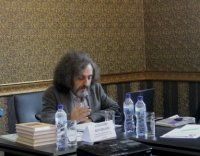5-02-2016, 00:00 Category: English, News
 Interactive lecture "Freedom of expression: how not to suffer for statements in media and on the Internet and not to violate the anti-extremism law. Kyrgyz reality and Russian practices” with participation of invited expert Alexander Verkhovsky, director of Sova Center for Information and Analysis (Russia) was held on February 4, 2016.
Interactive lecture "Freedom of expression: how not to suffer for statements in media and on the Internet and not to violate the anti-extremism law. Kyrgyz reality and Russian practices” with participation of invited expert Alexander Verkhovsky, director of Sova Center for Information and Analysis (Russia) was held on February 4, 2016.
Experts, lawyers, journalists, representatives of international and public organizations were invited to the event.
Inga Sikorskaya, director of School of Peacemaking and Media Technologies, presented the findings of hate speech analysis in media and internet in 2015. According to this study, discriminatory language was often reported in social networks, whereas Facebook users led the ranking of hate speech propagators. Therefore, users should be more responsible about network publications, discern the fine line between the freedom of expression and calls for action, and tell one from the other.
"Hate speech carries serious consequences,” Sikorskaya noted. "In the society, discriminatory language can encourage or accompany hate crimes; authors, in turn, can become a subject of lawful or reasoned accusations.”
In 2015, users and authors in Kyrgyzstan received warnings for inappropriate statements and were called in for "crime prevention talks”, whereas in Russia, where anti-extremism law is similar to the Kyrgyz one, the situation is much more serious.
According to Alexander Verkhovsky, director of Sova Center for Information and Analysis (Russia), a research organization that is also involved in studies of malpractice in the sphere of extremism countering, approximately 250 judgments for countering extremism have been delivered so far. 90% of these cases account for internet users.
"In terms of any legislation, everything that is available to third persons occurs in the public,” Verkhovsky said. "However, it is impossible to determine publicity on the internet with a mass of users and the law enforcer proceeds on the basis that [the statement] can be read by everyone on the globe, although it was addressed to few people.”
The same situation is with likes and repost. Despite the fact that in terms of criminal and administrative liability, you can’t persecute for indirect relationship with a statement (photo or other content), it is not always taken into account when instituting proceedings. Therefore, a like is often considered as a form of support to the statement.
"In Russia, there were cases when likes were mentioned among characteristics of the identity of the accused,” expert said.
If you want to repost in order to accuse, you should add your own comment, Verkhovsky advised to users, then, if necessary, you can prove in court that you didn’t support any illegal information.
In every case of repost, which is taken as a publication, its purpose should be investigated, which is not a common practice during the investigation. In blogs and social networks, it is a usual practice to repost without comments, since the author and readers understand the intention, but the investigator, prosecutor and judge can find it unclear.
On the other hand, for assessment of public statements, the court should pay attention not only to a comment, but also to relevant conditions: context of the statement, author of the statement, level of influence of the author, kind of audience and real negative consequences.The event was held with the support of the Canada Fund for Local Initiatives (CFLI).

The School of Peacemaking and Media Technology in Central Asia announces an annual competition among students from Kyrgyzstan, Kazakhstan,…

25 journalists and media workers from various regions of Kyrgyzstan have been trained to counter the propaganda of violent extremism and hate in…